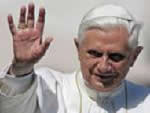|
Pope Benedict XVI- Angelus |
 Angelus
Message
Angelus
Message
On War
H.H. Benedict XVI
July 22, 2007
www.zenit.org
Dear Brothers and Sisters!
In these days of rest that, thanks be to God, I am passing here in
Cadore, I feel all the more intensely the impact of the sorrow of
the news that comes to me about bloody altercations and episodes of
violence that are occurring in so many parts of the world. This
brings me to reflect once again on the drama of human freedom in the
world. The beauty of nature reminds us that we have been placed here
by God to "cultivate and keep" this "garden" that is the earth (cf.
Genesis 2:8-17).
If men lived in peace with God and with each other, the earth would
truly resemble a "paradise." Unfortunately, sin ruined this divine
project, generating divisions and bringing death into the world.
This is why men cede to the temptations of the evil one and make war
against each other. The result is that in this stupendous "garden"
that is the world, there open up circles of hell.
War, with the mourning and destruction it brings, has always been
rightly considered a calamity that contrasts with God's plan. He
created everything for existence and, in particular, wants to make a
family of the human race. In this moment it is not possible for me
to not return to a significant date in history: August 1, 1917 --
almost exactly 90 years ago -- my venerable predecessor, Benedict
XV, published his celebrated "Nota Alle Potenze Belligeranti" (Note
to the Warring Powers), asking them to put an end to the First World
War (cf. ASS 9 [1917], 417-420).
As that huge conflict raged, the Pope had the courage to affirm that
it was a "useless bloodbath." This expression of his left a mark on
history. It was a justified remark given the concrete situation in
that summer of 1917, especially on the front here in this part of
northern Italy. But those words, "useless bloodbath," have a larger,
prophetic application to other conflicts that have destroyed
countless human lives.
Precisely these very lands in which we presently find ourselves,
which in themselves speak of peace and harmony, have been a theatre
in the First World War, as many testimonies and some moving songs of
the Alps still recall. These are events not to be forgotten!
It is necessary to make a treasury of the negative experiences that
our fathers unfortunately suffered, so that they not be repeated.
Benedict XV's "Nota" did not limit itself to condemning war; it
indicated, at a juridical level, the ways to construct an equitable
and durable peace: the moral force of law, balanced and regulated
disarmament, arbitration in disputes, freedom on the seas, the
reciprocal remission of war debts, the restitution of occupied
territories, fair negotiations to resolve problems.
The Holy See's proposal was oriented toward the future of Europe and
of the world, according to a project that was Christian in
inspiration but able to be shared by all because it was founded on
the law of nations. It is the same program that the Servants of God
Paul VI and John Paul II followed in their memorable speeches at the
United Nations, repeating in the name of the Church: "No more war!"
From this place of peace here in the north of Italy, where one feels
even more vitally how unacceptable the "useless bloodbaths" are, I
renew the call to follow with tenacity the way of law, to firmly
renounce the arms race, to reject in general the temptation to face
new situations with old systems.
With these thoughts and wishes in our heart we now offer up a
special prayer for peace in the world, entrusting it to Mary Most
Holy, Queen of Peace.
[Translation by ZENIT]
© Innovative Media, Inc.
This page is the work of the Servants of the Pierced Hearts of Jesus and
Mary